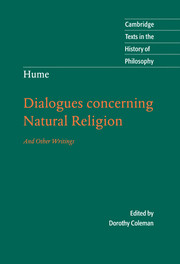Book contents
- Frontmatter
- Contents
- Acknowledgments
- Introduction
- Chronology
- Further reading
- Note on the text
- List of abbreviations
- DIALOGUES CONCERNING NATURAL RELIGION
- OTHER WRITINGS
- From Hume's memoranda
- Fragment on evil
- Letter to Francis Hutcheson, March 16, 1740 (extract)
- Letter to William Mure, June 30, 1743 (extract)
- Letters to Gilbert Elliot (extracts)
- From The Natural History of Religion
- Selections from Bayle
- Index
- Cambridge Texts in the History of Philosophy
From The Natural History of Religion
Published online by Cambridge University Press: 05 June 2012
- Frontmatter
- Contents
- Acknowledgments
- Introduction
- Chronology
- Further reading
- Note on the text
- List of abbreviations
- DIALOGUES CONCERNING NATURAL RELIGION
- OTHER WRITINGS
- From Hume's memoranda
- Fragment on evil
- Letter to Francis Hutcheson, March 16, 1740 (extract)
- Letter to William Mure, June 30, 1743 (extract)
- Letters to Gilbert Elliot (extracts)
- From The Natural History of Religion
- Selections from Bayle
- Index
- Cambridge Texts in the History of Philosophy
Summary
Editor's note: Originally published in 1757, Hume's Natural History of Religion was controversial for its claims that there are societies that have no religious beliefs, that religion originates in psychological causes such as hope and fear rather than in philosophical contemplation of the order in nature, that polytheism historically preceded monotheism, and that both polytheism and monotheism have a bad influence on morality, although polytheism has the advantage of being more tolerant of other religious sects.
Introduction
As every enquiry, which regards religion, is of the utmost importance, there are two questions in particular, which challenge our attention, to wit, that concerning its foundation in reason, and that concerning its origin in human nature. Happily, the first question, which is the most important, admits of the most obvious, at least, the clearest, solution. The whole frame of nature bespeaks an intelligent author; and no rational enquirer can, after serious reflection, suspend his belief a moment with regard to the primary principles of genuine theism and religion. But the other question, concerning the origin of religion in human nature, is exposed to some more difficulty. The belief of invisible, intelligent power has been very generally diffused over the human race, in all places and in all ages; but it has neither perhaps been so universal as to admit of no exception, nor has it been, in any degree, uniform in the ideas, which it has suggested.
- Type
- Chapter
- Information
- Hume: Dialogues Concerning Natural ReligionAnd Other Writings, pp. 124 - 136Publisher: Cambridge University PressPrint publication year: 2007



